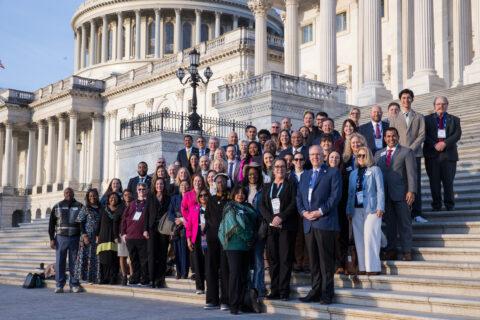Authored by Tami Fillyaw – Finance, Administration, Cybersecurity, Tax Leader, U.S. State and Local Government, Amazon Web Services
Tami Fillyaw is the Finance, Administration, Cybersecurity and Tax (FACT) Vertical Practice Leader for U.S. State and Local Government at Amazon Web Services. Tami served more than 20 years in state government overseeing budget, finance, licensing and consumer services and worked with county governments for several years. Engage with her at tfillyaw@amazon.com.
Across the U.S., cities, towns and villages are realizing the value of artificial intelligence (AI) in delivering services, improving citizen engagement and making better decisions for their communities.
According to a global study of 250 cities, 56% of cities are actively piloting or using AI to upgrade government operations and services, and 83% plan to do so over the next three years. Many cities have successfully deployed AI to improve road safety and traffic flow, aid in emergency response and enable predictive maintenance for water supply systems and energy grids. Cities are also using embedded AI to identify and mitigate cybersecurity events.
Licensing and Permitting
Cities are also embracing AI to modernize licensing and permitting operations to spur economic growth, boost supply of housing, expedite response times and transparency and improve compliance and customer satisfaction.
The City of Hamilton, ON, in collaboration with the Bloomberg Center for Cities, is using AI to scan first-stage building permit applications to ensure compliance with city rules, building codes and zoning requirements. The result: a 60 percent decrease in permit processing times. The Los Angeles City Planning Department also uses AI to analyze land use regulations and zoning data to proactively identify issues that need to be addressed during the permit application review.
Cities are also integrating AI and GIS into the permitting process to drive a better digital experience. The City and County of Honolulu, HI, integrated residential permit applications, inspections, enforcement and land management tools with its online portal and mobile app to help guide customers through the application process and obtain status updates. The time to complete residential permits dropped 70 percent.
Other benefits of using AI in licensing and permitting processes include:
- Improved data accuracy and reduce errors: AI can extract and classify data from various document formats, such as PDFs and CAD files, to facilitate the review process.
- More informed decision making: Machine learning can analyze historical data and large data sets from multiple knowledge bases to identify trends and patterns, and forecast service and supply needs based on construction intelligence and population density and growth.
- Better response times and customer experience: AI-powered platforms allow for 24/7 interaction and visibility into the status of applications. AI-enabled chatbots can help answer questions about licensing requirements, fees and inspections, and help auto-populate applications. In Honolulu, the city added an AI bot to support a permit prescreen process that helped cut wait times to get to a reviewer from six months to 2-3 days.
Another citizen-centric example is the City of Chicago, which launched OpenGrid, a real-time, open-source situational awareness program intended to improve citizen satisfaction and efficiency of city operations. Leveraging AWS infrastructure, OpenGrid allows the public to interact with city data in order to see information about business license filings, traffic concerns and emergency response calls via 311. By enhancing responsiveness and transparency, AI is transforming citizen experiences and strengthening public trust in government.
As AI technology evolves, so will opportunities. One such opportunity is Agentic AI, in which multiple AI agents work together to automate and handle multi-step tasks. For example, Agentic AI can coordinate the actions of several business processes, from checking applications for errors or missing information to validating plans and generating compliance reports and then notifying applicants of approvals and collecting applicable fees.
Conclusion
Modern cities need modern tools. Integrating AI into licensing and permitting operations empowers cities to reduce risk by automating compliance reviews, lessen administrative burdens so employees can focus on more complex tasks and deliver services to citizens and businesses in a more timely, responsive manner.
Effectively harnessing the power of AI requires cities to dedicate time to understanding the unique capabilities of AI tools and which tools to invest in that will best advance strategic objectives. Successful AI adoption will also be contingent on ensuring privacy and security of sensitive data, training and upskilling employees and fostering public trust through transparency and responsible use of AI.
At AWS, we offer a number of free trainings and certifications on AI that are specific to roles held by government professionals and highlight real-world use cases. For those that learn by doing, we also offer fun and interactive tools to learn how to quickly build and use AI applications with AWS.
AWS also ideates with public sector customers to implement AI solutions securely through the AWS Generative AI Innovation Center and Cloud Innovation Centers.
AI is reshaping how we live, work and learn. In city government, we have the opportunity to navigate AI with intention and confidence.
Visit the NLC Strategic Partnerships page to learn more about the organizations like Amazon dedicated to making NLC the premier resource for local governments.








